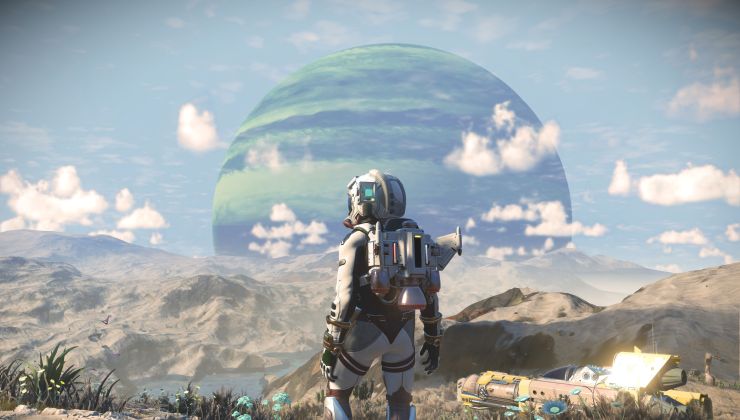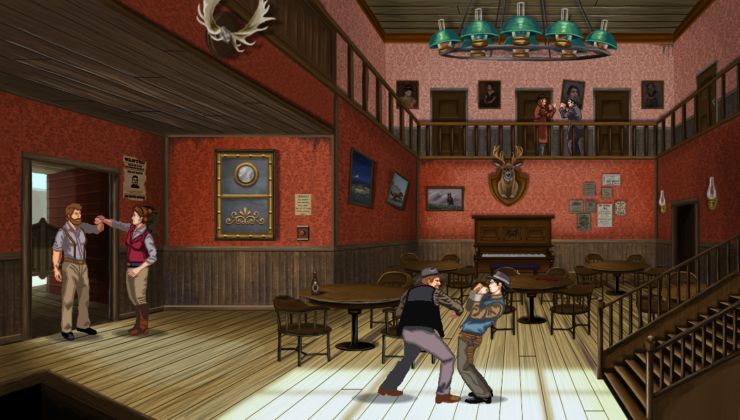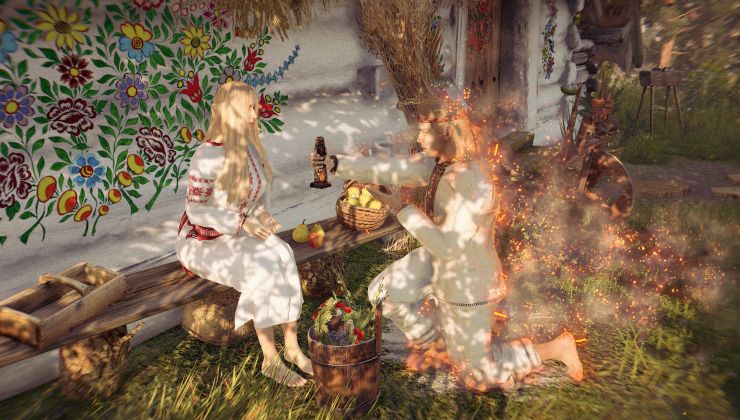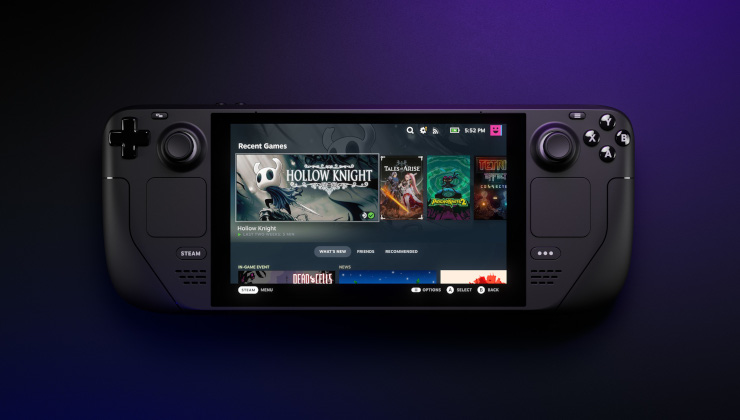How about we start Monday off with an interesting little titbit? According to a former Valve staffer, Steam for Linux was started up by ex-Microsoft employees.
The information comes from Richard Geldreich, part of the Linux team who left Valve back in 2014. On Twitter, Geldreich interestingly said this:
What isn't commonly known is that the original Steam Linux effort was started and led by a number of ex-Microsoft employees who, for various reasons, believed that Windows was going in the wrong direction.
Definitely something I didn't know. It sort of makes sense though, with many in the gaming and tech industry showing concern on where Microsoft was taking Windows. Valve's Gabe Newell (who also worked at Microsoft) famously said Windows 8 was "a catastrophe for everyone in the PC space" and that getting their games and Steam onto Linux was "a hedging strategy". From the big touch orientated interface that tried dropping the traditional desktop, to the hinted plans at pushing people towards the Windows Store there was a lot of ire aimed at Windows 8.
Getting Steam on Linux, and the original Valve blog posts like the "Faster Zombies!" lit a fire under Microsoft, clearly feeling a little threatened (or perhaps just motivated to do something) as Geldreich actually wrote on his blog back in 2017 that Microsoft ended up paying Valve a visit.
Without Valve's initial push into Linux, and their continued support with various projects and contracts with developers to work on improving all manner of things like the Linux Kernel, Mesa drivers and more, Linux gaming would have gone nowhere. It's still a tiny niche now of course, but it's come a very long way in terms of usability and performance.
Windows IS still going in the wrong direction. Long may it continue.But why tho?
What is the reason we "hate" Windows? Is it just because, or is it because it's going in a wrong direction?
Wouldn't it be better for everyone if it just started to go in a good direction instead?
Of course this is not likely to happen, but it's a valid question.
I for one wouldn't care for Linux growth if Windows would be a decent, non-spyware OS. Tho that doesn't mean I'd switch, far from it.
Yes, it's a valid question for sure.
Windows drove me away from Windows, but Linux made me stay at Linux.
Now I would want Linux to gain traction, which is easier as long as Windows s*cks.
Which would also help open source.
I'm not sure that's 100% rational, though. :)
Nothing surprising really. Valve's initial efforts on GNU/Linux were always a result of Microsoft's attempts to wall up everything. GNU/Linux wasn't ready for gaming at the time, but for a variety of reasons the potential started to appear and Valve kind of nudged (with a freight train) it along.
What's more surprising to me is Valve continuing. They won't be getting anywhere near a direct return on investments, at least I wouldn't think so, and it seems relatively little of their efforts are tied into Steam itself. Helping drivers, graphics, VR, etc, benefits more than Valve - it does help non-Steam users too. So maybe it's more about continued pressure on Microsoft than anything else.
Just me thinking out loud.
I think continuing the effort also gives them an advantage, on one hand, if the user count grew, they would become the "google play store" of video games on linux, but they probably also benefit with gaining influence and connections with the various projects they throw their money and employers behind.
Spyware was a big part of it, but also a lot of choice was taken away in Windows. Windows tried to follow Mac's ease-of-use designs which ended up taking away several configuration choices. I like to say that the idea of running Windows didn't feel like it would be my computer anymore. Running Linux very much makes it feel like my computer again.Windows IS still going in the wrong direction. Long may it continue.But why tho?
What is the reason we "hate" Windows? Is it just because, or is it because it's going in a wrong direction?
Wouldn't it be better for everyone if it just started to go in a good direction instead?
Of course this is not likely to happen, but it's a valid question.
I for one wouldn't care for Linux growth if Windows would be a decent, non-spyware OS. Tho that doesn't mean I'd switch, far from it.
FWIW, I suspect Microsoft handles private data better than companies like Google and Facebook. I'm not sure so they'd go to bat against the government like Apple has though, especially since they've had a long history of government contracts.
Spyware was a big part of it, but also a lot of choice was taken away in Windows. Windows tried to follow Mac's ease-of-use designs which ended up taking away several configuration choices. I like to say that the idea of running Windows didn't feel like it would be my computer anymore. Running Linux very much makes it feel like my computer again.Windows IS still going in the wrong direction. Long may it continue.But why tho?
What is the reason we "hate" Windows? Is it just because, or is it because it's going in a wrong direction?
Wouldn't it be better for everyone if it just started to go in a good direction instead?
Of course this is not likely to happen, but it's a valid question.
I for one wouldn't care for Linux growth if Windows would be a decent, non-spyware OS. Tho that doesn't mean I'd switch, far from it.
FWIW, I suspect Microsoft handles private data better than companies like Google and Facebook. I'm not sure so they'd go to bat against the government like Apple has though, especially since they've had a long history of government contracts.
Yup, I left about a year ago because if the builtin spyware. I also was constantly redoing my system tweaks where most of them got reverted after a big update for Windows was release.
I also was frustrated with the inconsistent design. Some parts are made for tablet users, other parts are made for the good old PC day's, it was and still is a big mess.
I also don't care about any of those useless UWP apps that Microsoft made. I just want a desktop designed for the PC with a consistent design everywhere. I also hated how theming is impossible on Windows. Sure, you can apply a 3rd part crack that enables some theming but with Windows there is a high chance of that patch breaking your system or the next Windows Update will break it or will make your theme stop working.
So Linux for me. It fixes all of the above problems and I get a lof of new stuff that is cool. Only downside is that some multiplayer games don't work, but all in all, it is perfect.
Nothing surprising really. Valve's initial efforts on GNU/Linux were always a result of Microsoft's attempts to wall up everything. GNU/Linux wasn't ready for gaming at the time, but for a variety of reasons the potential started to appear and Valve kind of nudged (with a freight train) it along.Surprising, but understandable. Before Linux there was barley a choice- while you could game on Mac, i would not propose it as alternative price-wise. During this time there was no one who could oppose Microsoft. It was rather "deal with it or disappear" scenario. Now, there's a backup plan. Now Microsoft most consider its moves, one big misstep along the way can irreversibly push their userbase onto alternatives. You can clearly see in the comments that even small design changes can be turnover point for some. Of course, we are still too small to really count- but i think it is safe to assume that because of use Microsoft started listening to its customers.
What's more surprising to me is Valve continuing. They won't be getting anywhere near a direct return on investments, at least I wouldn't think so, and it seems relatively little of their efforts are tied into Steam itself. Helping drivers, graphics, VR, etc, benefits more than Valve - it does help non-Steam users too. So maybe it's more about continued pressure on Microsoft than anything else.
Just me thinking out loud.
My thoughts exactly. I don’t love Linux because "it’s Linux", like someone supports a sports team because it’s based in their town. I love it because it does things right. If Microsoft did more things right, everyone would benefit, starting with the masses of people who don’t know there are better alternatives and just buy a computer at the store.Windows IS still going in the wrong direction. Long may it continue.But why tho?
What is the reason we "hate" Windows? Is it just because, or is it because it's going in a wrong direction?
Wouldn't it be better for everyone if it just started to go in a good direction instead?
Of course this is not likely to happen, but it's a valid question.
I for one wouldn't care for Linux growth if Windows would be a decent, non-spyware OS. Tho that doesn't mean I'd switch, far from it.
Microsoft doing more open source, embracing open standards and having less spyware and better security should be something we can all look forward to. Especially since YOUR data is going to end up on a Windows system no matter what OS YOU use. Windows continuing to suck and get worse is only really helpful insofar as it drives people to better alternatives, and I would rather it be an advocate for those best practices than drive people to them out of sheer exasperation.
In a world of botnets, State profiling and corporate interests, "bad computers" are a threat to the whole network.
Last edited by Salvatos on 6 Jan 2020 at 4:29 pm UTC
Why arch based?
(no criticism, just curious why that over Debian)
In my point of view would be better for a "Gaming System" due to updated packages and easy to install third party software (AUR packages).
I remember most of the complaints were about outdated MESA/Pulseaudio packages because Valve had to backport then due to the outdated ones Debian use by default, and not having a "Netflix App", Both of the cases I think would be less of a burden for a Arch based system.
But again, just my opinion as a person who uses Linux to play some games.
In any case if anyone is interested, apparently both forms exist, but according to Merriam-Webster, the notation with a “t” is less common:
https://www.merriam-webster.com/dictionary/titbit
https://www.merriam-webster.com/dictionary/tidbit
Thus ends my first contribution to this fabulous site...:D
Unrelated to the conversation at hand, but I stumbled over the word “titbit” in the first sentence. Personally I hadn’t seen it written like this before, but only as “tidbit” i.e. with a “d” instead of a “t”. Believe it or not this was the reason for creating an account with GOL.I'll be honest, it was and now is a somewhat amusing (tit) misspell on my part that just so happens to also exist and be the same thing so I lucked out :D
In any case if anyone is interested, apparently both forms exist, but according to Merriam-Webster, the notation with a “t” is less common:
https://www.merriam-webster.com/dictionary/titbit
https://www.merriam-webster.com/dictionary/tidbit
Thus ends my first contribution to this fabulous site...:D
There are two aspects to my dislike of Windows. One is that early Microsoft was a particularly virulent organization. Young Bill Gates was a very unethical, predatory, rapacious individual and he hired predatory, unethical people and they did a lot of really bad things.Windows IS still going in the wrong direction. Long may it continue.But why tho?
What is the reason we "hate" Windows? Is it just because, or is it because it's going in a wrong direction?
Wouldn't it be better for everyone if it just started to go in a good direction instead?
Of course this is not likely to happen, but it's a valid question.
I for one wouldn't care for Linux growth if Windows would be a decent, non-spyware OS. Tho that doesn't mean I'd switch, far from it.
The other is more general: Windows is a monopoly. Corporations want to make profits. Free market theory suggests that this means corporations would compete hard on an even playing field to create the best products and the most efficient processes for producing them. Some of that stuff does happen, but what free market theory ignores is that it is possible to cheat. Rather than all that competing on a level playing field jazz, corporations would prefer to have monopolies so they can simply set prices at a level where they make obscene profits. If they have one, they would prefer to keep it.
And it turns out most of the things you can do to keep a monopoly once you have it are bad for consumers, bad for technological development, and don't have much to do with mythical level playing fields. So even if Microsoft is now a more ordinary, business-as-usual sort of monopoly, having to a fair degree shed the unique rapacity of the early days, they remain a corporation busily maintaining a monopoly (a couple of monopolies, actually--there's Office too) and that is inevitably going to be a Bad Thing. Structurally, such things are incapable of "going in a good direction" for very long.
Of course if Linux took over it would not be a monopoly since Linux isn't a commercial firm any more than the C++ computer language is.
(For those who are unaware: No working definition of "monopoly" requires 100%; Windows has way more of its market than Standard Oil, the archetypal monopoly, had when they broke it up)
Last edited by Purple Library Guy on 6 Jan 2020 at 7:52 pm UTC
I think updates aren't the problem so much as updates not breaking things. The situation is better than it was, and hindsight shows better ways than Valve initially tried, but it remains one aspect of GNU/Linux and gaming that is more troublesome than it should be.
Usually I would agree with you, but games usually require fresh updates (specially with graphic drivers),and while I think Debian is a great distro (since I use at work) they have the habit of not update anything that's not a security issue (even minor bugs/glitches) until a major release, and this is bad for our case as we may have some minor performance issue in some specific game with some specific card and drive version, that need a specific fix in the newest drivers release, etc.
Sure they can backport those packages if necessary, but I think mixing old packages with new packages can be more problematic than just downgrade a faulty package if needed.
Also they don't need to be bleeding edge like vanilla Arch, they could've used some approach like Manjaro, but with more time between those versions (maybe an new release every quarter?) where they could just check if those packages didn't break anything essential.
TL;DR: Debian is stable in general, but takes too long to fix minor problems and implement performance features.
If that were solved, drivers in their current shape, and DXVK of course, and then SteamOS (and maybe the machines too) released....well, things might have turned out different.
You may not believe me now, but I did predicted the "fail" of steam machines since day 1 due to they not working the SteamOS before start to release then to the average public (the machines, not the system)
Back to my first comment, If Steam machines/OS was first released today, the results probably would be different, because of a now more mature Vulkan and the game changer DXVK.
Pretty much best comment. Personally, i chose Tumbleweed, due to mix of fresh packages and relative stability (on top with beeing one of "good" KDE distros). I would like to hear some more recommendations of similar distros- fresh, but not bleeding edge packages and preferably rolling release.I think updates aren't the problem so much as updates not breaking things. The situation is better than it was, and hindsight shows better ways than Valve initially tried, but it remains one aspect of GNU/Linux and gaming that is more troublesome than it should be.
Usually I would agree with you, but games usually require fresh updates (specially with graphic drivers),and while I think Debian is a great distro (since I use at work) they have the habit of not update anything that's not a security issue (even minor bugs/glitches) until a major release, and this is bad for our case as we may have some minor performance issue in some specific game with some specific card and drive version, that need a specific fix in the newest drivers release, etc.
Sure they can backport those packages if necessary, but I think mixing old packages with new packages can be more problematic than just downgrade a faulty package if needed.
Also they don't need to be bleeding edge like vanilla Arch, they could've used some approach like Manjaro, but with more time between those versions (maybe an new release every quarter?) where they could just check if those packages didn't break anything essential.
TL;DR: Debian is stable in general, but takes too long to fix minor problems and implement performance features.
If that were solved, drivers in their current shape, and DXVK of course, and then SteamOS (and maybe the machines too) released....well, things might have turned out different.
You may not believe me now, but I did predicted the "fail" of steam machines since day 1 due to they not working the SteamOS before start to release then to the average public (the machines, not the system)
Back to my first comment, If Steam machines/OS was first released today, the results probably would be different, because of a now more mature Vulkan and the game changer DXVK.
Just to say that yeah, I can see Debian being a bit slow for necessary driver updates, especially when it's driver, mesa, llvm, xorg, etc, all needing to be updated for that one fix!
(side note: actually I use wine when system libs are updated and a game no longer runs, but thankfully that's quite rare)
And apologies, reply limited because I'm on my phone's keyboard, but some good notes & thoughts, thank you!
Thank you for asking my opinion :)













 How to set, change and reset your SteamOS / Steam Deck desktop sudo password
How to set, change and reset your SteamOS / Steam Deck desktop sudo password How to set up Decky Loader on Steam Deck / SteamOS for easy plugins
How to set up Decky Loader on Steam Deck / SteamOS for easy plugins
See more from me